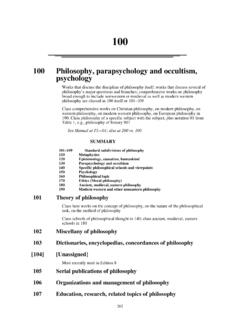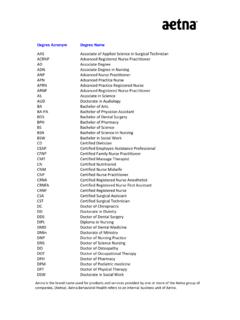Transcription of FOUR MODELS OF COUNSELING IN PASTORAL MINISTRY
1 FOUR MODELS OF. COUNSELING IN. PASTORAL MINISTRY . [ DR. TIMOTHY KELLER ]. Anyone engaged in PASTORAL MINISTRY today is faced with various frameworks for COUNSELING . This article identifies four main spheres of COUNSELING , the similarities and differences between them, and how one can carefully engage biblical principles in modern-day COUNSELING . INTRODUCTION. A major issue facing those doing PASTORAL MINISTRY today is the question of the place of COUNSELING . Let me frame the problem in general terms: Some ministers realize that many churches have uncritically adopted secular MODELS of COUNSELING based on the expressive individualism of the Enlightenment and modern romanticism.
2 In reaction to this, many others have virtually ignored the importance of COUNSELING in the shepherding of God's flock. They seem to assume that strong preaching and exhortations to repentance and obedience will su ce to help people with their problems. Is there a way to avoid either of these inadequate positions? During the early twentieth century modern psychology was largely ignored by American Protestants. In the 1950's and 1960's, some christian scholars (mostly at Fuller Seminary, Rosemead School of psychology , and the christian Association for Psychological Studies) began the Integration model for COUNSELING and psychology .
3 Then, in the 1970's, Jay Adams at Westminster Theological Seminary reacted to this trend and formulated the Biblical COUNSELING approach (originally called nouthetic COUNSELING . ) He saw COUNSELING as simply applying the Scripture to people's hearts through exhortation and coaching, and he placed no emphasis on plumbing the depths of the person's past. Soon, however, rumblings began to be heard to the left of Integrationism. Some Christians, mostly among those working in the world of academic psychology , developed the Levels of Explanation model , an approach that was even more friendly to modern psychology than the original Integration model was.
4 On the other hand, further rumblings also were heard to the right of Integrationism. During the last ten to fifteen years, some have felt that the Integrationists were conceding too much to modern psychology . They wanted a much sharper critique of psychological theories, yet they did not want to identify with the Biblical COUNSELING movement. Some have called this christian psychology . The christian Association for Psychological Studies (CAPS) organization split. The continuing CAPS group is more open to modern psychology and the Levels of Explanation model , while the new organization, the American Association of christian Counselors (AACC), is by far the larger and includes Integrationists and others more critical of modern psychology .
5 Meanwhile, there were many within the Biblical COUNSELING movement who had come to see Adams's approach as too simplistic, based on a naive understanding of the flesh, and ultimately too moralistic. All of these changes have caused the options for christian COUNSELING to become varied and complex. In the 1970's I took courses in COUNSELING at Gordon-Conwell Theological Seminary under professors who were Integrationists leaning strongly toward the validity of psychology . My wife Kathy took her degree in COUNSELING at Gordon-Conwell under the same teachers. In the middle of our seminary career, however, we went to | 1. Philadelphia and took an intensive course in advanced PASTORAL COUNSELING from Jay Adams to get the other side.
6 (Back then these two positions were the only options.) Adams made more sense to us than what we had received at Gordon-Conwell, and for my first nine years of MINISTRY in which I had an extremely heavy COUNSELING load I. leaned on Adams's approach and material. I began to notice, however, some limitations to his approach: it focuses almost exclusively on a person's behavior to the point of ignoring issues of the heart and motivation. During the 1980's when I taught at Westminster Theological Seminary I became personal friends with the younger counselors at the christian COUNSELING and Educational Foundation (CCEF). These teachers and counselors were making revisions to Adams's COUNSELING model .
7 Meanwhile I was also close friends with Tremper Longman, whose associates Dan Allender and Larry Crabb were trying to mark out a position somewhat more open to psychology than Biblical COUNSELING but less open to it than Integrationism. They received rather strong critiques from CCEF. I am not a teacher of COUNSELING , nor have I written anything about it (except this paper!) So I hardly think of myself as having marked out some new, perfectly balanced position. Rather, I am a working pastor, and over the years I've had to ask myself, In light of all these options and positions, what kind of counsel and COUNSELING should I be giving to my people?
8 What follows is my answer to that question. UNDERSTANDING FOUR MODELS OF COUNSELING1. 1. LEVELS OF EXPLANATION model . A liated groups: christian Association for Psychological Studies (CAPS); The Journal of psychology and Christianity; Fuller Seminary School of psychology Basic premise: psychology and biblical theology deal with di erent dimensions of human life, use di erent methods of study, ask di erent questions, and look at two di erent things. The Bible looks at the human spirit and relationship to God. psychology looks at how the human brain functions, how people adapt and react to natural and social environments. psychology and biblical theology, therefore, provide insights that are complementary and not contradictory to one another.
9 They should be kept distinct. psychology is a science that, when conducted properly, goes a long way to eliminate the biases of the researcher. Bottom line: No real biblical critique of modern psychology . Criticism: In actuality, modern psychology and biblical theology do look at many of the same things: motivations, su ering, abuse, anger, worry, fear, a desire for meaning in life, and so on. Thus, this view does not really take seriously the strength and comprehensiveness of the claims of either psychology or theology. The only possible way to hold that psychology and theology operate independently of one another at di erent levels is to support the view (ironically, a very specific theological view) that the soul and the spirit are two di erent things.
10 The final result is that the Bible is not permitted access to parts of human life over which it claims authority. The philosopher Alasdair MacIntyre has demonstrated that empirical science can only describe what is, never what people ought to As soon as you move from description (is) to prescription (ought), you have moved out of the realm of science into the realm of morals, religion, and values. Science might prove, for example, that there is a biological basis for a certain kind of behavior, but it cannot prove that a person should resist the behavior or acquiesce to it. As soon as you move to ought, that is, to COUNSELING , you are no longer a scientist.




